Democracy is an illusion! It’s become a political system fostered by the élite, for the élite, in order to fool the people that they have a stake in the system. In actual fact, they have virtually none. The whole political system in the modern era, despite having noble beginnings, is now used to benefit the few at the expense of the many. – Mark Alexander, June 29, 2018
Showing posts with label G20. Show all posts
Showing posts with label G20. Show all posts
Sunday, 22 November 2020
Trump Slams Paris Climate Accord in His Last G20 Appearance | G20 Riyadh
Labels:
Donald Trump,
G20
Tuesday, 19 June 2012
 THE GUARDIAN: Angela Merkel poised to remove opposition to direct lending by rescue fund in move seen as step towards sharing debt burden
THE GUARDIAN: Angela Merkel poised to remove opposition to direct lending by rescue fund in move seen as step towards sharing debt burdenAngela Merkel is poised to allow the eurozone's €750bn (£605bn) bailout fund to buy up the bonds of crisis-hit governments in a desperate effort to drive down borrowing costs for Spain and Italy and prevent the single currency from imploding.
Germany has long opposed allowing the eurozone's rescue fund, the European Financial Stability Facility, to lend directly to troubled eurozone countries, fearing that Berlin would end up paying the bill, and the beneficiaries would escape the strict conditions imposed on Greece, Portugal and Ireland.
But Merkel has come under intense pressure as financial markets have pushed up borrowing costs for Spain to levels that many analysts see as unsustainable.
Analysts are likely to see the decision as the first step towards sharing the burden of troubled countries' debts across the single currency's 17 members, though it falls short of the "eurobonds" proposed by the European commission president, José Manuel Barroso.
A spokeswoman for Merkel said: "Nothing has been decided yet." » | Patrick Wintour in Los Cabos | Tuesday, June 19, 2012
THE GUARDIAN: Germany surrenders over eurozone bailout fund: All the financial firepower Europe can muster will be used to drive down Spain's borrowing costs – that, at least, is the talk » | Larry Elliott, economic editor | Tuesday, June 19, 2012
Labels:
Angela Merkel,
debt,
debt sharing,
Eurozone,
Eurozone Bailout Fund,
G20,
Germany,
Mexico
Monday, 18 June 2012
 REUTERS FRANCE: LOS CABOS, Mexique - L'hypothèque électorale grecque à peine levée, les dirigeants européens sont sous pression pour s'engager à prendre "toutes les mesures nécessaires" pour mettre fin à l'interminable crise de la dette, lors d'un sommet du G20 placé sous le signe de l'emploi et de la croissance.
REUTERS FRANCE: LOS CABOS, Mexique - L'hypothèque électorale grecque à peine levée, les dirigeants européens sont sous pression pour s'engager à prendre "toutes les mesures nécessaires" pour mettre fin à l'interminable crise de la dette, lors d'un sommet du G20 placé sous le signe de l'emploi et de la croissance.Au lendemain de la victoire des partis favorables aux mesures d'austérité en Grèce, qui éloigne temporairement le spectre d'un éclatement de la zone euro, le groupe des vingt pays les plus industrialisés et des puissances émergentes (G20) a entamé lundi une réunion de deux jours à Los Cabos, au Mexique.
Selon le projet de communiqué final lu à Reuters par une source du G20, les membres de la zone euro sont invités à s'engager à "prendre toutes les mesures politiques nécessaires pour préserver l'intégrité et la stabilité de la zone euro, y compris en matière de fonctionnement des marchés financiers et en brisant la boucle qui lie les Etats souverains et les banques".
Les partenaires européens de l'Espagne lui ont offert il y a dix jours un plan de 100 milliards d'euros pour venir en aide à ses banques, ce qui n'a fait qu'attiser les craintes d'une nouvelle escalade de la crise financière, illustrée par la flambée lundi du coût de la dette espagnole et italienne. » | Par Stella Dawson et Luke Baker | Benoit Van Overstraeten et Tangi Salaün pour le service français, édité par Natalie Huet | lundo 18 juin 2012
Labels:
crise de la dette,
Europe,
G20,
Mexique,
Union européenne
 THE GUARDIAN: EC president says European leaders have not come to Mexico to receive lessons on how to handle the economy
THE GUARDIAN: EC president says European leaders have not come to Mexico to receive lessons on how to handle the economyThe opening day of the G20 summit was threatening to deteriorate into a fractious row between eurozone countries and other non-European members of the G20, notably the US, as EU commission president José Manuel Barroso insisted the origins of the eurozone crisis lay in the unorthodox policies of American capitalism.
As Europe's leaders came under intense pressure to act decisively to cure the euro's ills, and a campaign gathered pace to relax some of the austerity programmes laying waste to countries burdened with unsustainable debt levels, Barroso insisted that Europe had not come to the G20 summit in Mexico to receive lessons on how to handle the economy.
When asked by a Canadian journalist "why should North Americans risk their assets to help Europe?" he replied: "Frankly, we are not here to receive lessons in terms of democracy or in terms of how to handle the economy.
"By the way this crisis was not originated in Europe … seeing as you mention North America, this crisis originated in North America and much of our financial sector was contaminated by, how can I put it, unorthodox practices, from some sectors of the financial market." » | Patrick Wintour in Los Cabos, Ian Traynor in Brussels and Helena Smith in Athens | Monday, June 18, 2012
Labels:
debt crisis,
Eurozone,
G20,
José Manuel Barroso,
Mexico,
US bankers,
US banks
Saturday, 5 November 2011
Labels:
G20
THE GUARDIAN: IMF to monitor Italy to ensure austerity as leaders fail to agree plan for financial aid for distressed countries
A world recession has drawn closer after a fractious G20 summit failed to agree fresh financial help for distressed countries and debt-riddenItaly was forced to agree to the International Monetary Fund monitoring its austerity programme.
Financial markets fell sharply after the two days of talks in Cannes broke up in disarray, amid concerns that Italy will now replace Greece at the centre of Europe's deepening debt crisis.
UK hopes that the Germans would relent and allow the European Central Bank to become the lender of last resort for the euro were also dashed.
On a day of unremitting gloom and yet more market turbulence, the Greek prime minister, George Papandreou, won a late-night confidence vote in his parliament after making a speech in which he promised to start powersharing talks to form a caretaker coalition government. Although he won the vote by 153-145, he is now expected to step down and a national unity government is expected to take over in the coming days.
Papandreou said he would visit the country's president on Saturday to launch power-sharing talks "with the [opposition] parties … for the formation of a government of broad co-operation."
In a sign that the spread of the debt crisis to Italy could break up the single currency, the chancellor, George Osborne, admitted the Treasury was undertaking crisis planning for a eurozone collapse. » | Patrick Wintour and Larry Elliott in Cannes | Saturday, November 05, 2011
Related »
Labels:
David Cameron,
European Union,
Eurozone,
G20,
global recession
THE DAILY TELEGRAPH: The British economy is getting worse “every day” that the euro crisis goes unresolved, David Cameron has warned, as he told European leaders that the “world cannot wait” any longer for a rescue package to be agreed.
The Prime Minister condemned the “endless questions and changes” in the eurozone that led to the G20 summit of world leaders ending acrimoniously without a detailed plan. His warning that the crisis is having a “chilling effect” on the economy heightened fears that growth in Britain has stalled.
Following the two-day meeting in Cannes, Germany and France failed to explain how they intended to implement a €1trillion rescue package for the single currency after admitting that they were struggling to raise sufficient funds.
The US objected to proposals to increase substantially the size of the International Monetary Fund, which could directly help countries such as Italy. President Barack Obama made clear that he wanted eurozone countries to do more to solve the single currency’s problems.
Cash-rich emerging economies such as China were also not willing to help finance the eurozone bail-out until the Europeans themselves did more.
President Nicolas Sarkozy warned that a deal involving the eurozone and the IMF could take until February to finalise. » | Robert Winnett, Political Editor, in Cannes | Saturday, November 05, 2011
Labels:
British economy,
David Cameron,
euro,
European Union,
Eurozone,
G20
Friday, 4 November 2011
THE GUARDIAN: G20 summit on eurozone crisis is dominated by news about Greeks, while IMF is given more cash and fears grow over Italy
The G20 is planning to increase the crisis-fighting firepower of the International Monetary Fund after the start of its summit was dominated by the first open admission from EU leaders that it might be necessary for Greece to leave the eurozone if the single currency is to survive.
George Osborne said there was a "real sense of urgency" on a day that saw an emergency interest rate cut from the European Central Bank, backtracking from Greece over a referendum on its bailout conditions, and a recognition that the IMF may need extra resources to cope with a deteriorating global economy.
Amid distinct echoes of the financial market meltdown in the autumn of 2008, European leaders put massive pressure on the embattled government of Greek prime minister George Papandreou, forcing the abandonment of plans to hold a referendum and triggering a political showdown in Athens.
Downing Street sources said "strong political pressure to sort itself out" had been put on Greece, while Barack Obama said it was time to "flesh out" Europe's bailout plan. » | Larry Elliott, Patrick Wintour, and Angelique Chrisafis in Cannes | Thursday, November 03, 2011
Thursday, 3 November 2011
Saturday, 13 November 2010
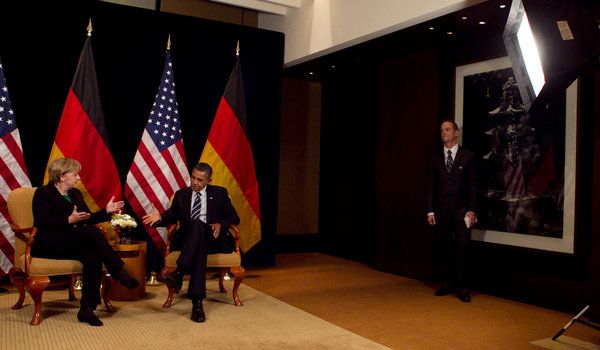
THE NEW YORK TIMES: SEOUL, South Korea — President Obama’s hopes of emerging from his Asia trip with the twin victories of a free trade agreement with South Korea and a unified approach to spurring economic growth around the world ran into resistance on all fronts on Thursday, putting Mr. Obama at odds with his key allies and largest trading partners.
The most concrete trophy expected to emerge from the trip eluded his grasp: a long-delayed free trade agreement with South Korea, first negotiated by the Bush administration and then reopened by Mr. Obama, to have greater protections for American workers.
And as officials frenetically tried to paper over differences among the Group of 20 members with a vaguely worded communiqué to be issued Friday, there was no way to avoid discussion of the fundamental differences of economic strategy. After five largely harmonious meetings in the past two years to deal with the most severe downturn since the Depression, major disputes broke out between Washington and China, Britain, Germany and Brazil.
Each rejected core elements of Mr. Obama’s strategy of stimulating growth before focusing on deficit reduction. Several major nations continued to accuse the Federal Reserve of deliberately devaluing the dollar last week in an effort to put the costs of America’s competitive troubles on trading partners, rather than taking politically tough measures to rein in spending at home.
The result was that Mr. Obama repeatedly found himself on the defensive. He and the South Korean president, Lee Myung-bak, had vowed to complete the trade pact by the time they met here; while Mr. Obama insisted that it would be resolved “in a matter of weeks,” without the pressure of a summit meeting it was unclear how the hurdles on nontariff barriers to American cars and beef would be resolved. >>> Sewell Chan, Sheryl Gay Stolberg and David E. Sanger | Thursday, November 11, 2010
THE NEW YORK TIMES: Obama Ends G-20 Summit With Criticism of China >>> Sewell Chan | Friday, November 12, 2010
THE TELEGRAPH: China believes its economic success reflects its superior culture.
The leaders of the G20 group of rich and developing nations met in Seoul this week for what might reasonably be described as their first post-crisis summit. But it also had the feeling of the first post-Western summit. China, the world’s second richest nation and its rising power, believes that the financial crisis was actually a “North Atlantic crisis”. Now that the worst of it is over, Beijing sees little reason to swallow the medicine for someone else’s sickness. The summit therefore broke up – none too amicably – without really addressing the trade imbalances that were one of the root causes of the crisis, or America’s worry that Beijing is gaining an unfair advantage by artificially keeping its currency weak. Instead, China flexed its muscles and got what it wanted: a watered-down statement that will not force it to change course. If President Obama hoped that the G20 would burnish his image as a world statesman after the disaster of the midterm elections, those hopes were disappointed.
It is inescapable that we are witnessing a historic shift of economic power from West to East. David Cameron has certainly taken this on board, judging by the caution with which he and his Cabinet members treated China during their visit earlier this week. The Prime Minister approached the subject of human rights far more obliquely than he did as leader of the Opposition. Whether this was wise judgment or a failure of nerve is difficult to say. Although China treats dissidents with gross inhumanity, the more it is lectured on the subject, the more intransigent it becomes. In a sense, that is convenient for Mr Cameron: if protesting about repression makes the situation worse, then Britain can concentrate on trade with a fairly clear conscience. Read on and comment >>> Telegraph View | Friday, November 12, 2010
Labels:
Angela Merkel,
Barack Obama,
Brazil,
China,
G20,
global economy,
Seoul,
South Korea,
United Kingdom
Thursday, 11 November 2010
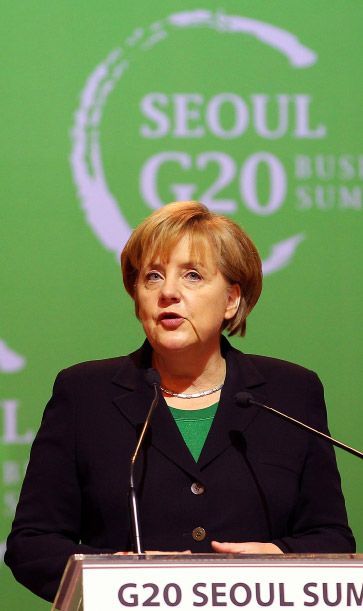 FRANKFURTER ALLGEMEINE ZEITUNG: Barack Obama hat in Seoul einen schweren Stand. China, Deutschland, aber auch Brasilien sind - gelinde gesagt - über die amerikanische Wirtschafts- und Finanzpolitik verstimmt. Das Anwerfen der Notenpresse in den Vereinigten Staaten weckt Ängste vor Inflation und Spekulation.
FRANKFURTER ALLGEMEINE ZEITUNG: Barack Obama hat in Seoul einen schweren Stand. China, Deutschland, aber auch Brasilien sind - gelinde gesagt - über die amerikanische Wirtschafts- und Finanzpolitik verstimmt. Das Anwerfen der Notenpresse in den Vereinigten Staaten weckt Ängste vor Inflation und Spekulation.Beim Gipfel der führenden Wirtschaftsmächte (G20) stehen die Vereinigten Staaten im Abseits. Das Anwerfen der Notenpresse durch die amerikanische Notenbank und die Idee einer „Exportbremse“ für Deutschland und China stießen schon vor Beginn des Treffens in der südkoreanischen Hauptstadt Seoul auf massive Kritik. Die G-20-Staats- und Regierungschefs wollen bis Freitag versuchen, einen „Währungskrieg“ und neue Schranken im Welthandel zu verhindern.
Bundeskanzlerin Angela Merkel (CDU) erteilte dem Vorschlag von Barack Obama eine klare Absage, führende Exportnationen müssten ihren Handelsüberschuss deckeln und stattdessen mehr für die heimische Nachfrage tun: „Eine politische Festlegung von Obergrenzen für Leistungsbilanzüberschüsse oder -defizite ist weder ökonomisch gerechtfertigt noch politisch angemessen“, sagte sie bei einem G20- „Business Summit“ vor 100 Topmanagern aus aller Welt. „Dies wäre unvereinbar mit dem Ziel eines freien Welthandels.“ >>> dpa | Donnerstag, 11. November 2010
Labels:
G20,
Seoul,
Südkorea,
US Finanzpolitik
Monday, 28 June 2010
LOS ANGELES TIMES: The Treasury secretary, speaking at the summit in Toronto, says the global recovery remains fragile and that ill-timed austerity measures could derail gains. Obama meets privately with other leaders.
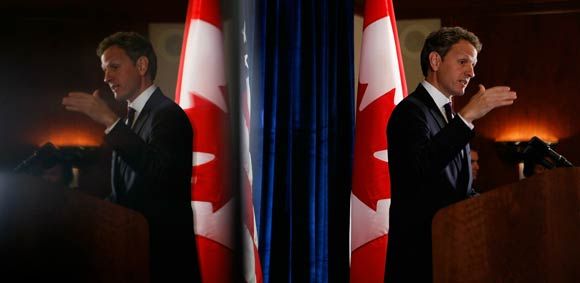
Reporting from Toronto — They smiled for photos and announced agreement on everything from nuclear containment to development efforts in Africa on Saturday, but world leaders gathered in Toronto have a tougher challenge as they get down to brass tacks on the best way to keep the global economic recovery from stalling.
Going into Sunday's meetings with the Group of 20 industrialized and emerging nations, the Obama administration was pressing leaders to stay the course they set more than a year ago to promote growth through government investment in the economy.
Spooked by economic meltdowns in Greece and elsewhere on their continent, European leaders came to those talks concerned about racking up a damaging level of debt. Their proposal of a punitive global tax on banks to fund future bailouts was meeting opposition from other nations but remained under consideration late Saturday.
But U.S. and Canadian leaders predicted that a common purpose would emerge before the G-20 summit ends Sunday, one representing a balance between economic stimulus and plans for deficit reduction.
"We have to find the right balance, and that balance is going to differ across countries," Treasury Secretary Timothy F. Geithner said. "But I think you're going to see a strong commitment again by these major economies to do what is necessary to make sure that we are supporting recovery and getting that balance right." >>> Christi Parsons, Los Angeles Times | Sunday, June 27, 2010
Sunday, 27 June 2010

THE GLOBE AND MAIL: Vigil at detention centre broken up by police; more than 400 arrested Saturday as storefronts vandalized, at least three police cars burned
More than 400 people have been arrested in connection with G20-related protests, and skirmishes between riot police and protesters continued into the early morning Sunday in downtown Toronto, only hours before leaders of the G20 are scheduled to begin their summit.
Police officers, with batons out, were searching bushes around a University of Toronto building near Russell Street and Spadina Avenue, in what appeared to be a major raid. At least two police buses were on the scene, along with more than 10 other police vehicles, mostly unmarked minivans. One bus was a "prisoner bus," a police officer said.
Several dozen police officers were searching trash cans. At least two people were seen with handcuffs on. More than 50 people had been arrested for wielding "street-type weaponry", such as bricks, police said. Some of thopse arrested looked much older than typical university students. The raid was at the Bancroft Building, the Earth Science Centre and the Graduate Students Centre.
After more than 14 hours of sometimes-violent confrontations between protesters and officers, the downtown core was largely quiet; discarded water bottles and plastic zip-tie handcuffs littered streets that had been the scenes of standoffs hours before. >>> Anna Mehler Paperny and Chris Hannay | Sunday, June 27, 2010
Labels:
anti-capitalism,
Canada,
G20,
street violence,
Toronto
THE GLOBE AND MAIL: Summit turns to dilemma of sustaining growth versus cutbacks
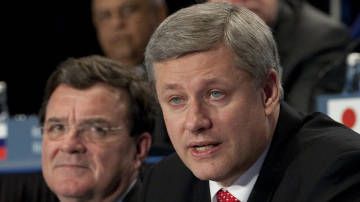
Group of 20 leaders meeting in Toronto Sunday will try to come up with an agreement on fiscal belt-tightening that finds the right balance between telling markets they are serious about cutting deficits and debt, and keeping the global economy from backsliding.
Prime Minister Stephen Harper opened the second day of talks by saying the summit must strike the proper balance between sustaining economic growth and pulling back fiscal deficits.
“Here is the tightrope we must walk,” Mr. Harper said. “To sustain the recovery, it is imperative that we follow through on existing stimulus plans. At the same time, advanced countries must send a clear message that as our stimulus plans expire, we will focus on getting our fiscal houses in order.”
Separately Sunday, German Chancellor Angela Merkel told reporters the summit leaders will agree to Mr. Harper’s call for countries to slash their budget deficits by half by 2013.
“This will be part of the final document,” she said. Continue reading and comment >>> Jeremy Torobin | Sunday, June 27, 2010
Labels:
Angela Merkel,
Canada,
G20,
Stephen Harper,
Toronto
Friday, 25 June 2010
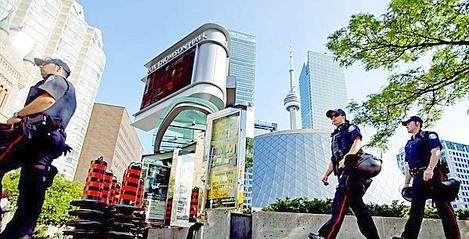
LE TEMPS: Précédé par le G8, le G20 commence ce samedi. Les Européens font pression pour une taxe bancaire
La ville est déjà morte. Malgré la température estivale, Toronto semble désertée par ses habitants. La presse canadienne l’explique par le périmètre de sécurité dressé autour de l’Exhibition Center, au bord du lac Ontario, qui accueille dès ce soir la quatrième réunion du G20. De multiples restrictions de circulation paralysent une partie du centre ville. Des commerçants, qui redoutent aussi les manifestations, chiffrent déjà la perte à quelque 15% de leur chiffre d’affaires mensuel. «Moi, j’ai loué toutes mes chambres, alors j’aimerais un G20 tous les week-ends!», plaisante un hôtelier interrogé par Le Temps. >>> Frédéric Lelièvre, Toronto | Vendredi 25 Juin 2010
Subscribe to:
Posts (Atom)

